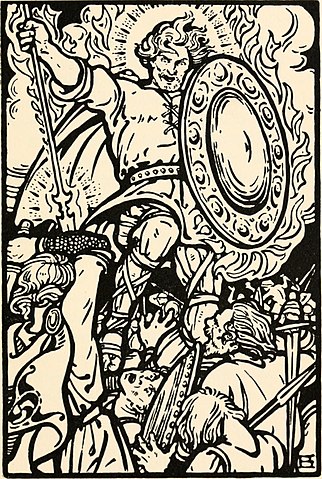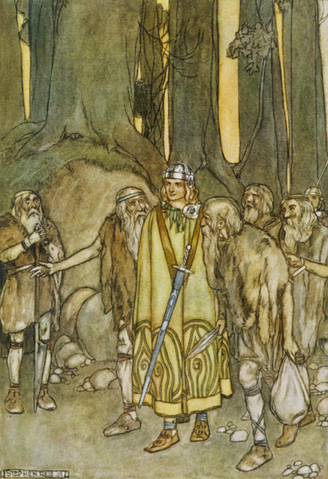Young Fionn mac Cumhaill
Fionn mac Cumhaill is one of the most famous figures in Irish mythology. You may have heard about his legendary feats as the leader of the Fianna, a band of heroic warriors. But before he became a mighty hero, he was a young boy living in hiding. This post will tell the story of his early life—his family background, the dangers he faced, and how he was raised in exile to protect him from his enemies.
The Mythical Setting

Understanding Fionn mac Cumhaill‘s childhood helps to picture the Ireland of old. In those days, a High King ruled the land, and different clans often fought for power. Druids were highly respected because of their knowledge of magic and the natural world. Warriors known as the Fianna roamed the countryside, hunting and protecting the kingdom. It was a time of adventure, mystery, and fierce rivalries.
Fionn’s Lineage and Family
Fionn mac Cumhaill’s father was Cumhall, the original leader of the Fianna. He was known as a brave and skilled warrior. Fionn’s mother was Muirne, sometimes called Muirne Muncháem. Her father, Tadg mac Nuadat, was a powerful druid with great influence in the land. The marriage between Cumhall and Muirne caused a lot of trouble because their families had different interests, and some people in power did not approve.
When Fionn was born, he was first called Deimne. Over time, people began to call him Fionn, a name meaning “fair” or “bright,” because of his light hair and complexion.
The Conflict Leading to Exile

Tragedy struck when Cumhall was killed in battle by another warrior named Goll mac Morna, who then took over as leader of the Fianna. After Cumhall’s, there was a power shift, and many enemies still wished harm to his family. Muirne’s father, Tadg, was furious about her relationship with Cumhall and threatened her. Read about the death of Fionn’s father here.
Fortunately, the High King stepped in and said Muirne must not be harmed. However, Muirne still feared for her child’s safety. Cumhall’s enemies would see the child as threatening their power. Muirne placed him under the care of two trustworthy guardians to protect her newborn son.
Life in Exile
Fionn mac Cumhaill was taken into hiding and raised by Bodhmall—who was said to be Cumhall’s sister—and Liath Luachra, a skilled warrior woman. They took him deep into the forests and remote places of Ireland. Here, Fionn learned to live with nature, finding food, building shelter, and staying hidden from those who wished him harm.
During this time, Bodhmall and Liath Luachra taught him everything he needed to survive in a harsh world: hunting, tracking, and self-defence. They also guided him on being wise and careful with his words and actions. Fionn’s secluded upbringing allowed him to grow strong in mind and body, preparing him for the life he would later lead.
Foundations of a Hero
Thanks to the lessons from his two guardians, Fionn developed many skills that would define him in the future. He became brave, clever, loyal, and deeply connected to the land and its creatures. Many myths say he had a natural sense of justice, shaped by his early experiences surviving on the fringes of society.
These qualities laid the groundwork for him to eventually return from exile and claim his place as a leader. He would gather the Fianna under his command, become famous for his wisdom and courage, and earn a place as one of Ireland’s greatest champions.
Conclusion
The story of Fionn mac Cumhaill’s early years reminds us that even great heroes often have humble or difficult beginnings. By learning hunting, survival, and wisdom from Bodhmall and Liath Luachra, Fionn built a strong foundation to support his many legendary feats.
Stay tuned for future posts if you’d like to learn more about Fionn’s later life, including his leadership of the Fianna, the famous Salmon of Knowledge tale, and his epic adventures. What do you think makes Fionn’s upbringing so special? Share your thoughts in the comments, and let’s explore his legend together!
Thank you for reading! If you enjoyed discovering Fionn’s hidden childhood, keep an eye out for more stories from Ireland’s stories of myths and legends.
Recommended Reading:
- Lady Augusta Gregory’s Gods and Fighting Men
- T.W. Rolleston’s Celtic Myths and Legends
- Marie-Louise Sjoestedt’s Gods and Heroes of the Celts
